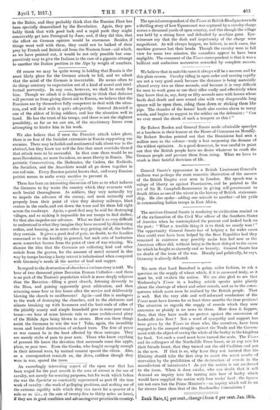In regard to the destruction of churches a curious story
is told. We hear of two thousand pious Bavarian Roman Catholics—and there is no part of the Teutonic population which is more deeply religious than the Bavarian—filling a great church, listening devoutly to the Mass, and gaining apparently great edification, and then returning some four or five hours after the service and deliberately blowing the church to smithereens! Again—and this is analogous to the work of destroying the churches, and to the elaborate and minute breaking up with hammers and the butt-ends of rifles of the pitiably scanty and simple household gear in some poor man's house—we hear of some historic ruin or some architectural glory of the Middle Ages being blown to atoms. How can these things assist the Germans to win the war ? Take, again, the incredibly mean and brutal destruction of orchard trees. The fate of peace or war cannot be in the least affected by these outrages. They are merely stabs of pain to poor men. Those who know anything of peasant life know the devotion that surrounds some fine apple, plum, or pear tree. Even the Greeks, who fought savagely enough in their internal wars, by mutual consent spared the olives. Also, as a correspondent reminds us, the Jews, ruthless though they were in war, spared the trees.


























 Previous page
Previous page